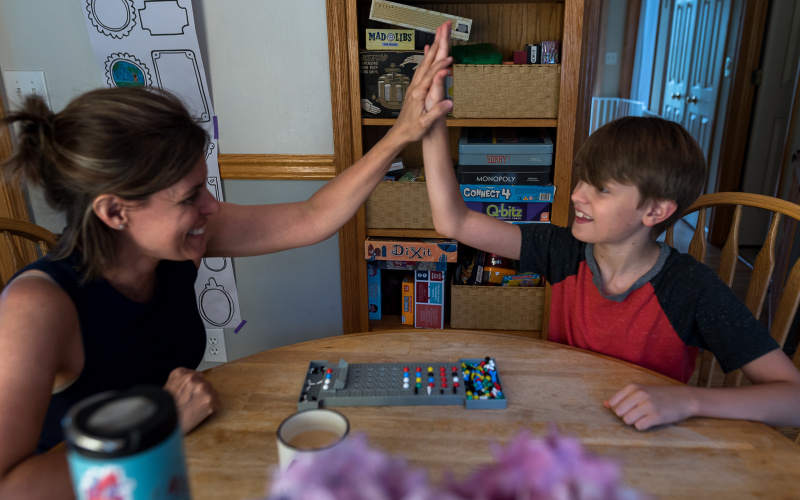Homeschooling with Clarity, Confidence, and Calm | A Conversation with Michelle Brownell
Imagine this: It’s a regular weekday, and you’re deep into homeschooling your bright and quirky kids. While juggling all the activities, household chores, and community responsibilities and starting to feel overwhelmed, you realize how important it is to set boundaries and say “no” sometimes.
It can be hard to juggle everything, but maintaining your mental health and your family’s emotional stability is paramount.

Navigating Commitments with Mindfulness
Do you find yourself stretched thin with commitments that end up compromising your family’s tranquility?
If so, you’re not alone.
Many homeschooling parents encounter this challenge. The trick lies in valuing the quality of commitments over quantity. Saying no isn’t just okay, it’s often necessary to keep your home a haven of peace and learning. Getting your kids involved in making the decisions can help.
When we involve our children in decisions affecting their lives, we help them feel connected and safe. It’s crucial to work together to understand what your kids need. Real collaboration helps in customizing their educational experiences and fostering an environment where they can thrive.
Choosing Relationships Over Academics
It’s an undeniable truth—no one can replace you as a parent to your children. Our personal experiences underline the power of prioritizing family well-being over social expectations. Remember, in homeschooling, the relationship you nurture with your child is foundational, sometimes even more so than the academics.
As your children grow, their needs evolve, and so does your homeschooling approach. The journey from crayons to calculus can involve intertwined schedules and a dance around children’s growing pursuits. Be adaptable and mindful that each phase brings its distinct set of challenges, joys, and learning opportunities.
And remember to connect with your kids throughout it all.

Finding the Right Learning Approaches
Case in point: Teaching math to a child with dyscalculia requires patience and creativity. It’s not about how much they memorize; it’s about the progress they make without experiencing undue stress or shutdowns.
Introducing games and sensory items can make all the difference while keeping an eye on their stress levels—encouraging a safe and connected environment even in the midst of difficulty.
Creating a Safe Educational Space
Understanding your children’s moods is vital. Observing whether your child is momentarily hesitant or experiencing deeper issues helps in providing the necessary support. Safety and connection before textbook knowledge helps ensure that their learning is effective, and more importantly, cherished.
Homeschooling During Tough Times
Every family goes through crises, and during these times, homeschooling can be particularly challenging. When facing personal tragedies or times of great stress, it’s okay to seek help and slow down. Concentrate on what truly matters—mental and emotional well-being for you and your kids.
You don’t have to do everything! Homeschooling isn’t about proving how much you can handle; it’s about fostering growth and a love of learning in your children at a pace that’s healthy for everyone involved.
Every commitment and activity should be weighed against its impact on your kids’ emotional safety. Lessons come in many forms, not just from textbooks but also from movies, discussions, and everyday life. Learning is flexible and, in times of crisis, understanding your child’s capacity for progress is what truly counts.
Focusing on Depth Over Breadth
Dive deep rather than wide—allow your children to thoroughly explore areas of interest rather than skimming the surface of many. This approach often yields surprising personal growth and academic mastery.

Having Compassion and Building Connection
Lastly, show yourself some compassion and extend it to your children. Rekindle connections and enjoy the extraordinary journey of homeschooling. Each day, take pride in creating an insightful, nurturing space for your children to become lifelong learners.
Remember, homeschooling is not a sprint; it’s a marathon with diverse terrains. Building strong relationships, valuing emotional stability, and respecting the unique path each child takes are the cornerstones of a fulfilling and effective homeschooling experience.
RLL #232: Homeschooling with Clarity, Confidence, and Calm | A Conversation with Michelle Brownell
In this week’s episode, special guest Michelle Brownell, a veteran homeschooling parent and advocate for emotionally secure learning environments chats with us about the challenges of homeschooling twice-exceptional children and the universal lessons on setting healthy boundaries for family wellbeing.
Check out these takeaways:
- Understand and exercise your right to say no to protect your family’s emotional well-being and maintain a tranquil household.
- Create a learning partnership with your children that respects their stress thresholds and leverages their innate interests.
- Remember that sometimes less is more – slowing down can lead to deeper learning and stronger family bonds.
Join us on a journey of discovery, compassion, and growth on your path as a homeschool parent. Whether you’re new to homeschooling or a seasoned pro, there’s something for everyone in this rich conversation.
Links and Resources from Today’s Show
- SPONSOR|CTC Math
- SPONSOR|Night Zookeeper
- Raising Lifelong Learners Membership Community – The Learners Lab
- Homeschool Strengths & Struggles Conference Starting February 15th with Michelle Brownell
- Homeschool Essentials Community with Michelle Brownell
- Raising Resilient Sons by Colleen Kessler, M.Ed.
- Parenting Gifted Kids with Gail Post Ph.D.
- Parenting in the Moment with Your Child
- Parenting and Teaching a Twice Exceptional Child
- Parenting Gifted and Intense Children
- RLL #102: A Conversation about Connection with Shawna Wingert
- Finding Homeschool Balance
- Coping with Stress | Supporting Kids and Teens
Leave a Rating or Review
Doing so helps me get the word out about the podcast. iTunes bases their search results on positive ratings, so it really does help — and it’s easy!
-
- Click THIS link to go to the podcast main page.
- Click on View in iTunes under the podcast cover artwork.
- Once your iTunes has launched and you are on the podcast page, click on Ratings and Review under the podcast name. There you can leave either or both! Thanks so much.

